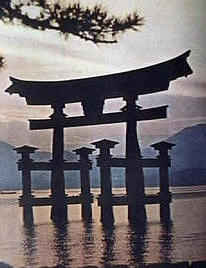| |||||||||
JAPANESE POETRY
A very
short poem (17 syllables) with a traditional,
classic form (three lines of 5 - 7 - 5
syllables)
intended to express and evoke
emotion.
Most true haiku contain a word
("kigo") suggesting a
particular season of the
year and they usually are
made up of the
following two elements:
(1) a general condition (permanence)
(2) a momentary perception (change)
It is the meeting of these two
elements that creates
the "spark" of haiku,
without which, the verse is not
haiku but
merely a brief 17 syllable statement.
The
poet does not comment on the connection
between the two
elements but leaves the
synthesis of the two
images up to the reader
to perceive through
his own experience.
TIME and PLACE and a
FLEETING OBSERVATION
work together as a
STARTING POINT for the
reader's own train
of thought, emotions and
experience and he
must fill in all the rest.
Haiku begin in
the middle of a scene or thought
and then end
immediately after the thought
has been
suggested or indicated.
A haiku poet is a
"Zen man" in that the
unfinished nature of
his poem corresponds
to the positive use of
"what is not there!"
~~~~~~~~~~~~~~~~~~~
natsu-gussa ya
tsuwa mono domo ga
yume no
ato
summer grasses
of brave
warrior's dreams
all that
remains
~~~~~~~~~~~~~~~~~~~~~~~~~~~~
furu
ike ya old pond ~~~~~~~~~~~~~~~~~~~~~~~~~~~~
koi ni mina did it yell
~~~~~~~~~~~~~~~~~~~~~~~~~~~~
toi yama
no far off mountains
~~~~~~~~~~~~~~~~~~~~~~~~~~~~
akai tombo
red dragon flies ~~~~~~~~~~~~~~~~~~~~~~~~~~~~ kongo no a drop of dew ~~~~~~~~~~~~~~~~~~~~~~~~~~~~
kumo ori ori clouds come
from time to time ~~~~~~~~~~~~~~~~~~~~~~~~~~
omokage ya
I see her now ~~~~~~~~~~~~~~~~~~~~~~~~~~~~ kago no
tori at the butterflies ~~~~~~~~~~~~~~~~~~~~~~~~~~~~
yagate
shinu so soon to die, ~~~~~~~~~~~~~~~~~~~~~~~~~~~~ utsukushi ya a lovely thing to see ~~~~~~~~~~~~~~~~~~~~~~~~~~~~
kawazu tobi komu
mizu no
oto
and a frog jump
in
water sound
naki shimaute
ya
semi no kara
til it became
all voice?
cicada shell!
me dama ni utsuru
tombo
kana
are mirrored in its eye
the dragonfly
sara sara nagaru
akane zora
forming like ripples
toward a crimson sky
tsuyu hito tsubuya
ishi no ue
sits on a rock
like a diamond
hito ni
yasumuru
tsuki mi kana
and bring to men a chance
to rest
from looking at the
moon
oba hitori naku
tsuki ni tomo
old woman weeping alone
the moon her companion
cho wo urayamu
me tsuki kana
kana.
the caged bird gazes
envying
just watch its eyes!
keshiki wa mie zu
semi no
koe.
and no sign of it is showing
locust cry
shoji no ana no
ama no gawa.
through the paper
window's hole
the milky way

 ~NEXT~
~NEXT~



